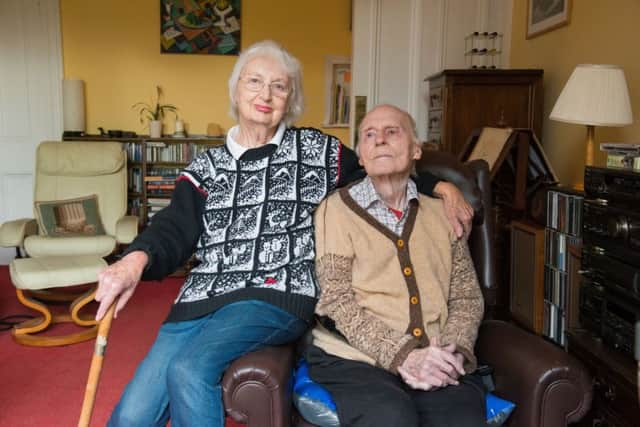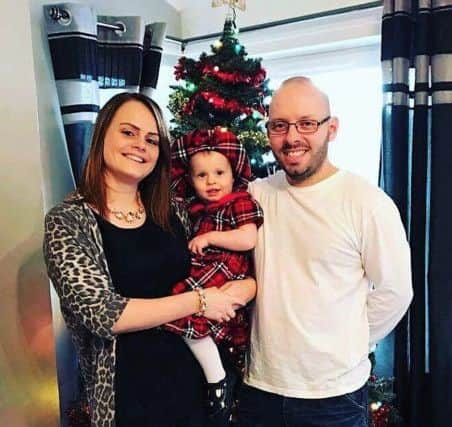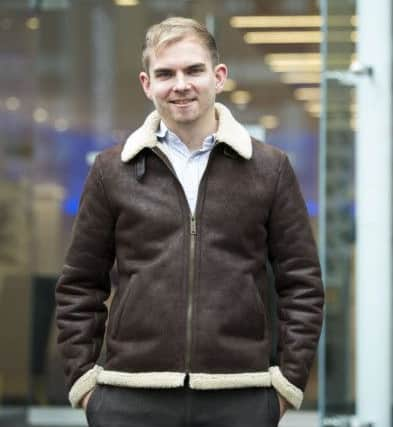Budget 2017 funded by '˜fire sale' of banking shares
and live on Freeview channel 276
The Treasury revaled plans to raise £15 billion by selling off two-thirds of its stake in the Capital-based bailed-out bank, despite RBS’s share value currently being half the value the government paid.
The sell-off has tallied up almost two-thirds of a £25bn stimulus packed announced by the Chancellor in yesterday’s Budget.
Advertisement
Hide AdAdvertisement
Hide AdSNP Westminster leader Ian Blackford said it was the wrong time for a “fire sale” of the public’s shares in RBS, and former business secretary, Sir Vince Cable labelled the move “rather desperate.”


A series of tax-cutting measures were at the heart of yesterday’s Budget, including a £2bn package for Scotland.
The First Minister yesterday said more than half of the £2bn Scottish package – £1.1bn spanning the next three years – was in “financial transactions”, which will have to be repaid to the Treasury. The rest – about £900 million – is also split between 2018-19, 2019-20 and 2020-21.
A series of tax-cutting measures were at the heart of yesterday’s Budget, but they won’t all apply to Scots. Higher earners south of the Border will benefit from a rise in the higher-rate income tax threshold, which the SNP is not extending in Scotland, and first-time buyers in England will also escape stamp duty.
Advertisement
Hide AdAdvertisement
Hide AdBut Scots will benefit from a rise in the personal allowance, which goes up from £11,500 to £11,850. The contentious £40 million VAT bill faced by Police Scotland was also axed by Mr Hammond, while whisky duty was frozen and fresh support unveiled to support the oil and gas industry.


The Chancellor bowed to pressure from across the political spectrum to ease the hardship faced by some of the poorest families because of the government’s reforms to benefits.
The Chancellor said waiting times for initial payments of Universal Credit would be cut from six weeks to five weeks, and £1.5bn invested so that new claimants can get an advance on the next month’s benefit within five days of making a request.
“Universal Credit delivers a modern welfare system, where work always pays and people are supported to earn,” Mr Hammond said.
Advertisement
Hide AdAdvertisement
Hide Ad“But I recognise the genuine concerns on both sides of the House about the operational delivery of this benefit.”


Unions accused the Chancellor of “letting down” millions of public sector workers in England and Wales, with no commitment to lift the pay cap.
The sell-off of RBS shares comes as the firm’s headquarters in Edinburgh is awaiting a multi-billion-dollar fine from US regulators over mis-selling of toxic mortgage bonds, and is fighting claims that a business restructuring division exploited its own clients to asset-strip their companies.
RBS shares will start being offloaded by March 2019. At current prices, the government would make a £26bn loss on its 71 per cent shareholding.
Advertisement
Hide AdAdvertisement
Hide AdThe extra money, which Ms Sturgeon will be free to spend next year, amounts to £183m in revenue cash and £69m of capital spending.


In April, Mr Hammond told MPs that he had to “live in the real world” and that fair value “could well be below what the previous government paid”. In his Budget speech, the Chancellor insisted the UK ecomomy was strong and would “confound those who seek to talk it down”.
But Paul Johnson, the director of the Institute for Fiscal Studies, said the downgrading of growth forecasts meant the UK ecomomy would be £65bn smaller by 2020 compared with expectations last year.
Mr Hammond told MPs he would use the “fiscal headroom” he gave himself by not paying off the UK’s debt until the middle of the next decade in order to invest in trying to boost productivity.
Advertisement
Hide AdAdvertisement
Hide AdMs Sturgeon has set out a range of proposals that ministers are considering for income tax hikes under Holyrood’s new fiscal powers. They would generate between £80m and £290m in extra cash, depending on the scenario that is favoured by Finance Secretary Derek Mackay when he sets out his Scottish Budget next month.
The First Minister described the “financial transaction” funding yesterday on Twitter as “money that can be used for limited purposes only and has to be repaid”.
The funding has previously been used for the Help to Buy Scotland mortgage support scheme and the Scottish Investment Bank.


The headline announcement in the Budget was the abolition of stamp duty for first-time property buyers on homes worth up to £300,000. However, this will not apply in Scotland, where ministers have introduced the Land and Buildings Transaction Tax, which applies a levy of 2 per cent on property sales between £145,000 and £250,000. This rises to 5 per cent from £250,000 and 10 per cent from £325,000.
Advertisement
Hide AdAdvertisement
Hide AdTory leader Ruth Davidson said: “SNP ministers must look again at their reckless plans to raise income tax in Scotland.”
“As a result of the Chancellor’s decisions, they are getting £2bn extra funding to help meet their own spending commitments.
“With income tax and stamp duty being cut south of the Border, there is a growing tax gap between people in Scotland and elsewhere in the UK.”
More funding needed for our social care system
Retired academic publisher Heather Goodare, 86, has cared for husband Ken, 88, in their Edinburgh home since he suffered a stroke in November 2007.
Advertisement
Hide AdAdvertisement
Hide AdShe wants to see a large proportion of the £2bn investment in Scotland pumped into improving the nation’s deteriorating social care system.
Mrs Goodare said: “The biggest problem with any investment in Scotland is that we do not always know where the money is going, but we have experienced first hand just how stretched our social and elderly care system is.
“We understand that local authorities are having to cut costs quite dramatically, but as someone who benefits from home care and who has seen just how badly services have been affected by these cutbacks, it is clear that the system is close to collapse with the current funding structure in place.
“I would not be able to care for my husband by myself. It would be impossible for me to even come close to providing the kind of care that our home carers do. They do everything, from making sure Ken gets out of bed in the morning to ensuring he is able to get into his wheelchair – physically I would not be able to do that.”
Advertisement
Hide AdAdvertisement
Hide AdLast week, Scottish care home operators warned that more needs to be done to stabilise the sector or face large parts of the service ceasing to exist.
Dr Donald Macaskill, chief executive of Scottish Care, which represents the country’s social care sector, said research with frontline staff has highlighted the increasing strain being placed on the workforce.
Mrs Goodare added: “We lived in England for a number of years, right up until 2003, and we always found the NHS in Scotland to be much better.
“However, it it will not continue to provide the best possible care if budgets continued to be slashed.
Advertisement
Hide AdAdvertisement
Hide Ad“Of course, any extra investment in Scotland is fantastic and should absolutely be welcomed, but it would be unfortunate if further money was not allocated for improving health and social care in Edinburgh and beyond.”
Case study
Pensions consultant Karen Ross, 29, lives in Carrick Knowe, Edinburgh with partner Steven McLachlan and daughter Georgie, two.
She believes the increases in non-taxable income and extended railcard scheme will help working families combat the rising cost of living.
Under Budget plans, the tax-free personal allowance on income tax to rise to £11,850 in April 2018, while the national living wage is set to rise in April 2018 by 4.4 per cent, from £7.50 an hour to £7.83.
Advertisement
Hide AdAdvertisement
Hide AdHowever, she said the Budget could have done more to help families falling into the “just about managing” category.
She said: “The cost of living is rising all the time so the increase in non-taxable allowance is a small step in the right direction.”
“It is a small increase, but anything that helps lower-income families to make ends meet is definitely a good thing. It’s a similar story with the railcard, obviously the discount is relatively small, but for some people – including people I work with – that is a huge discount as they can often spend thousands just getting to work.
“Having said that, I think a lot of families are in the situation where they are only just managing to live within their means, so I would have liked to have seen a little bit more done to help them.”
Advertisement
Hide AdAdvertisement
Hide AdWill Fletcher, 27, moved to Edinburgh from Aberdeen in 2014 and now works in customer and business support for property firm ESPC.
He rents a flat in Leith and is hoping the abolition of stamp duty for first-time buyers up to £300,000 can help him to get on the property ladder.
He said: “I think it was a very positive Budget for first-time buyers and as someone who is looking to move on from the rental market onto the property ladder, the reduction in stamp duty is very welcome.
“It isn’t much fun when you hear about previous generations being able to afford to buy a house on nearly minimum wage, I don’t think that is even remotely possible now.
Advertisement
Hide AdAdvertisement
Hide Ad“I think the abolition of stamp duty might inspire a few more first-time buyers to make that leap from either living at home or renting to actually owning a home of their own. It maybe makes getting on the property ladder a bit more in reach, but it comes down to the money we have need for a deposit, that is always the killer.
“Obviously trying to buy a house in Edinburgh, much like in London, it is a bit of a bubble really, so if they were to build new homes in a commutable distance from the city, that would be something that would be attractive to first-time buyers.”